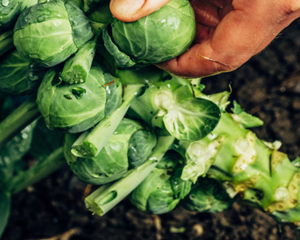As families gather around the table this holiday season, many will eagerly fill their plate with proteins, grains, and of course, desserts.
当这个假日季家人围坐在餐桌旁时,许多人会急切地在盘子里装满蛋白质、谷物,当然还有甜点。
Vegetables are often a harder sell, especially the more bitter variety known as brassicas, a category that includes kale, mustard greens, brussels sprouts, and broccoli.
蔬菜通常很难推销,尤其是被称为芸苔属的较苦的品种,这一类包括羽衣甘蓝、芥菜、球芽甘蓝和西兰花。
Some turn up their noses at tart fruits, as well.
有些人也会对酸水果嗤之以鼻。
In recent years, the aversion to eating bitter or pungent produce has prompted scientists to step up efforts to tweak the plants' DNA to reduce the enzymes that trigger these tastes.
近年来,人们对吃苦味或辛辣农产品的厌恶,促使科学家加紧努力调整植物的DNA,以减少引发这些味道的酵素。
The result are less bitter mustard greens, sweeter pineapples, and other crop varieties that have recently entered the marketplace or are about to.
结果是芥菜的苦味减少,凤梨和其他最近进入或即将进入市场的农作物品种变得更甜。
But while alterations like these increase the produces' popularity, they also diminish their healthful effects.
虽然这样的改变提高了产品的受欢迎程度,但也削弱了它们的健康作用。
The compounds that create the biting flavors of brassica vegetables are what make them so beneficial, says Michael Miller, a food scientist at the University of Illinois at Urbana-Champaign.
伊利诺伊大学厄巴纳-香槟分校的食品科学家迈克尔·米勒表示,正是这些化合物创造了芸苔属蔬菜的辛辣味道,使它们如此有益。
For example, the bitter-tasting chemical sulforaphane abundant in the vegetables has numerous antioxidant, antimicrobial, and anti-inflammatory properties.
例如,蔬菜中富含的苦味化学物质萝卜硫素具有多种抗氧化、抗菌和抗发炎特性。
As gene editing makes it ever easier to alter a crop's flavors, experts expect to see more changes to the tastes of vegetables and fruits in the coming years.
由于基因编辑使得改变农作物的口味变得越来越容易,专家预计未来几年蔬菜和水果的口味将发生更多变化。
The goal is to get more produce on people's plates, but the recipe for a healthy meal may still require a balance of flavors.
我们的目标是让人们的盘子里有更多的农产品,但健康餐的食谱可能仍然需要口味的平衡。
Plants often generate their bitter flavors as a way to protect themselves.
植物经常产生苦味,以此作为保护自己的一种方式。

The bitterness of raw brassica vegetables, for example, results when two components, the metabolite glucosinolate and the enzyme myrosinase, that are stored in separate parts of the plant mix in the mouth while chewing.
例如,生芸苔类蔬菜的苦味是由于两种成分(代谢物硫代葡萄糖苷和黑芥子酶)在咀嚼时在植物的不同部分中混合而产生的。
The resulting compound is quite pungent. "The thinking is this makes it less tasty, so the plant gets eaten less by insects or other predators," Miller says.
所得化合物非常刺激。米勒说:“我们的想法是,这会降低植物的味道,从而减少植物被昆虫或其他捕食者吃掉的情况。”
In humans, a distaste for bitter flavors starts at birth, when babies shun foods that don't taste sweet.
对人类来说,对苦味的厌恶从出生时就开始了,婴儿会避开不甜的食物。
Experts say this preference confers survival benefits, because many poisonous or spoiled ingredients are bitter.
专家表示,这种偏好有助于生存,因为许多有毒或变质的成分都是苦的。
Once we reach adulthood, the mouth's bitter taste receptors become less sensitive, which allows us to "adventure to enjoy the flavors of sourdough bread, hoppy beer, dark coffee, and dark chocolate," says Michael Mazourek, a vegetable-breeding researcher at Cornell University in Ithaca, New York.
纽约伊萨卡市康奈尔大学的蔬菜育种研究员迈克尔·马祖雷克表示,一旦我们成年,口腔的苦味感受器就会变得不那么敏感,这使我们能够“冒险享受酵母面包、花香味啤酒、黑咖啡和黑巧克力的味道”。
However, in many people some antipathy remains. Efforts to tame bitter flavors in fruits and vegetables to fit our palate are hardly new.
然而,许多人仍然存在一些反感情绪。抑制水果和蔬菜苦味以适应我们口味的努力并不是什么新鲜事。
"They've been going on since the dawn of agriculture," Mazourek says.
马祖雷克说,“这种现象自农业诞生以来就一直存在”。
For instance, many squashes early humans found in the wild were too bitter to eat, due to the abundance of the biting compound cucurbitacin.
例如,早期人类在野外发现的许多南瓜都太苦而无法食用,因为其中含有丰富的刺激性化合物葫芦素。
Once agriculture became domesticated around 12,000 years ago, though, growers began planting varieties containing less of the chemical.
然而,在大约12000年前农业被驯化后,种植者就开始种植含有较少化学物质的品种。
In recent years, genetic engineering has made making those changes in other produce simpler and more targeted.
近年来,基因工程使得其他产品的这些改变变得更简单、更有针对性。













